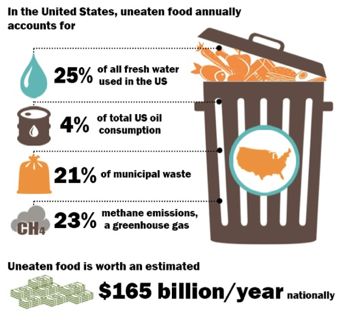 Did you know that an average family of four wastes enough food to provide for an entire extra family member?
Did you know that an average family of four wastes enough food to provide for an entire extra family member?
A study published in the journal PLOS ONE analyzed the relationship between food waste, diet quality, and environmental sustainability. They found that the amount of food wasted by the United States can be compared to 30 million acres of cropland wasted- that is approximately the size of Pennsylvania.
The PLOS ONE study also found that the average person produces a pound of food waste per day.
Consequences of Food Waste
The issue of food waste is not simply the issue of the wasted food from your plate. Food waste is linked to environmental issues such as runoff. Runoff occurs when excess surface water passes over agricultural land, carrying fertilizers and pesticides to nearby waterways.
 In addition, this excess of food that gets sent to landfills causes the release of greenhouse gases. Greenhouse gases absorb infrared radiation in the atmosphere, causing global warming.
In addition, this excess of food that gets sent to landfills causes the release of greenhouse gases. Greenhouse gases absorb infrared radiation in the atmosphere, causing global warming.
When food decomposes in a landfill, it does so anaerobically, or without oxygen. This anaerobic decomposition causes the release of methane, a potent greenhouse gas. Methane is also released by the digestive systems of cows, with dairy and meat being the second and third largest categories of food waste.
The largest category of food waste is fruits and vegetables. The PLOS ONE study used this data to link higher-quality diets to more food waste. Fruits and vegetables are often unnecessarily thrown away due to a slight damage or over-ripening. In addition, many schools require fruits and vegetables in school lunches, a lot of which is thrown away simply because the student did not want fruits and vegetables in the first place.
What Can You Do?
It may seem that a lot of environmental issues are much larger than your individual actions. However, food waste is a very easy problem to correct.
 One goal of the PLOS ONE study is to educate the public that things like a banana with a brown spot can still be eaten. You can also make an impact by getting smaller portion sizes, and only getting what you can eat. If you do have leftovers, make sure that you make use of them prior to their expiration date.
One goal of the PLOS ONE study is to educate the public that things like a banana with a brown spot can still be eaten. You can also make an impact by getting smaller portion sizes, and only getting what you can eat. If you do have leftovers, make sure that you make use of them prior to their expiration date.
Creating a compost to dispose of food waste can prevent anaerobic decomposition, and therefore the emission of methane. There are also many programs that repurpose food waste. Some farmers accept food waste from the general public and use it to feed farm animals like pigs. There are other programs that package untouched food from schools and restaurants and distribute it to the homeless.
Food waste is an extremely important issue in the United States and can have both economic and environmental consequences. This week, try to be aware of what you are putting on your plate, and how much of that ends up in the trash can at the end of your meal.
Sources: Washington Post, PLOS, sustainabletable.org









